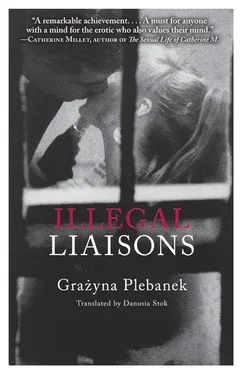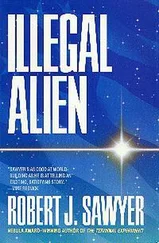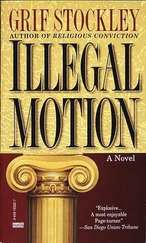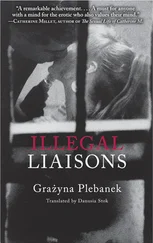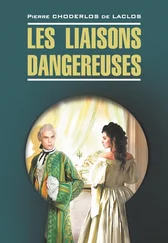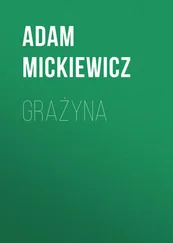And later Andrea goes away without saying a word. Jonathan learns from Stefan that his lover has been in Sweden for a week.
“Didn’t you know? What’s happening with you two?”
Jonathan waves it away – there are no words for this infernal circle.
“Surely it’s obvious what you don’t want to do,” says Stefan in the end.
Jonathan looks at him hopefully.
“You don’t want to leave Megi.”
“I don’t?” He looks as if someone has just called him a piece of celery.
“Because what would you do without her?”
“Which one?” Jonathan is lost.
Jonathan throws himself into a whirl of activity: he prepares for the end of term at his writing course, drives the children to their friends’ houses, rushes to school meetings, visits the gym. At times he feels cleansed of desire: he no longer wants to fuck Andrea, is free of those dreams. He strolls down the streets of Brussels, the wind sweeps over him, the balmy temperature soothes his inner seething – perhaps it will transform the lava into petrified peace, a beneficial numbness that won’t upset his daily life.
When, with its recurrences, love destroys the peace he’s had such difficulty in attaining, Jonathan uses his willpower to recall how Andrea courted Simon, how she wormed herself into his favor, how she had seen in him – what, in fact? With every couple, however guarded they may be, something pokes out from beneath their tight uniform, an unruly shirt, a partially ripped lining. Jonathan and Megi also showed the world how much held them together. How much? Perhaps too much, given how Stefan had summarized it.
There are a number of things that have an adverse effect on the decision to break up, thinks Jonathan: geographical distance, time span, and perhaps something else. He’s plagued by them all, even those without a name. He’s doing everything he can so as not to give in to temptation – he runs (flees), closes himself in at home or in his writing, meets people (cycling expeditions arranged by a circle of fathers he’d found on the internet), goes for a beer with Stefan.
In the end, he can’t bear it and writes to her again.
Andrea doesn’t answer. Jonathan waits until morning then texts her in desperation: “Will always love you and will always be stiff for you.” It is his sincerest declaration and she knows it. Several hours later she sends a smiling face. Nothing else.
Jonathan groans internally as his thoughts circle: how indifferent she must have grown if she’s waited so long to reply! Or perhaps she was busy? Jonathan scans the television and online news – there weren’t any important events that night – so what was she doing? Suspicion grips his throat. Something had happened, something that rendered his declaration unimportant.
He’s almost sure of what she was doing that night. Even so, he waits for at least one denial from her.
But no, she remains silent.
He pretended to be on form. “She’s too vanilla” – he turned over in his head his mother’s saying about a certain friend who had gone to the States, become a housecleaner, and then married the man whose house she was cleaning. She had a degree in physics, like Jonathan’s mother, but didn’t have enough luck to work in her field in the West. She became a perfect lady who lunched. “Why do you keep in touch with her?” Jonathan would ask his mother when Daisy (formerly Danuta) came to England for a few days. To his mind, Daisy resembled the cow on a Swiss chocolate wrapper; the description “vanilla” suited her dress sense and lack of sharp opinions. She came to his mind because he felt as though reality were attacking him like a piece of blunt glass. He wanted to be vanilla now. Not to know and not to feel.
They don’t go far, just to Normandy. Megi doesn’t want to go to Poland this time. Packed to the roof (“we’d pack any car up to the roof”), they say goodbye to Reyers Street. They fix their eyes on the apartment with sunken windows, pass the roundabout where there’s always a pink bicycle with a pannier of planted flowers. Once someone had stolen the flowers, but the following day new ones had already been planted; nature abhors a vacuum.
When Megi goes with the children to the bathroom at a service station, Jonathan checks his cell: no messages, Andrea is silent. As he gets further and further away from Brussels, so she, no doubt, is returning to Simon. Meanwhile, Megi appears through the sliding doors, Tomaszek wielding a balloon with the service station’s logo, Antosia scratching at the price of her new hairbands. Some southerners stare at his wife.
Jonathan takes her by the hand. Now is the time to mend everything – they’re on leave, she is here and so is he. Making sure that the children in the back are engrossed in their film, he places his hand on Megi’s knee. He is bubbling with desire. But as soon as his palm touches his wife’s skin, the tingling in his balls subsides. What does he feel? Barely tenderness. “That’s always something,” he would have thought, had he not remembered their trips together interrupted by intercourse on the lay-bys.
“We’re so good! Why aren’t we sinful?” Images explode in his memory: Andrea leans over him, teases his lower belly with her hair. Jonathan unwittingly squeezes Megi’s knee, she looks at him with devotion. Jonathan pulls his hand back with an apologetic smile, as if he’d jostled an old woman in the bus; the smell of old powder on old skin, or maybe talc, almost pervades him. “From talc we come, to talc shall we return.” He used to cover his tiny daughter’s bottom with the white powder. “Who’s going to help Antosia when she’s old?” groans Jonathan’s soul, which is no doubt destined for damnation.
“Look!” Megi’s voice tears him away from his pondering.
An Audi with an elderly driver stands in the lane next to theirs, the interior full of hanging puppets; the dolls swing as the car moves on. Shivers run down Jonathan’s back. This is a strange journey; thoughts teem, scramble over each other, circulate around real beings, bring into existence those unborn. Because if he were to fulfil Andrea’s wish and give her a child, where would they be now? What car would he be sitting in, whose knee would he be stroking, from what would he be running?
“That’s too much,” snorts Jonathan soundlessly and switches lanes, but his thoughts continue along their old track: so, he has a strong desire, but not for his wife! Jonathan grows angry. He’s giving so much of himself to his family, looking after them. And what about his needs? Resentment wells within him: he’s sacrificed so much.
“Am I Jesus?” He shrugs so that Megi looks quizzically at him.
He shakes his head without turning his eyes on her. Before Tomaszek was conceived, Jonathan had felt as if he was living with a ghost. Work had sucked Megi in, just as maternity had done before. And although she sometimes prepared supper and had her mother come around so that they could go to the cinema, Megi had been so absent he’d stopped believing in her corporeality. It was not until he once discovered she wasn’t wearing any panties beneath her skirt that something had vibrated between them. How long had she been walking around naked underneath, waiting for him to notice?
She’d opened up in Brussels again. She wanted him, so when he was less in touch with Andrea, Megi stepped into her place. Jonathan – lashed by a bad conscience, that far-reaching Christian scourge – wanted to offer her that place with his whole heart. He gave it and took it back because even now, as he repeated to himself that he’d sacrificed Andrea for the good of his family, he was scared. Because what if he suffocated the love in him, destroyed part of his life, part of himself – and his wife turned into a ghost again? What would Jonathan be left with?
Читать дальше
